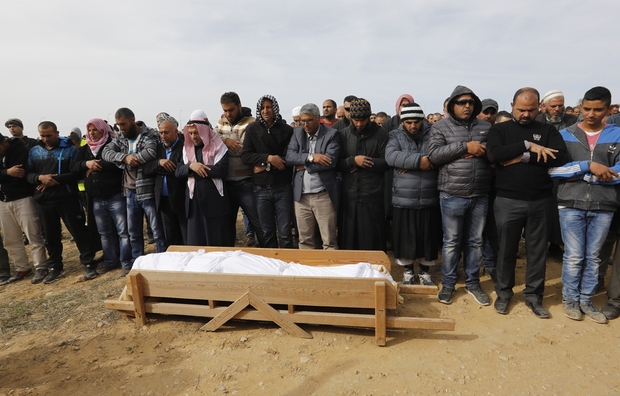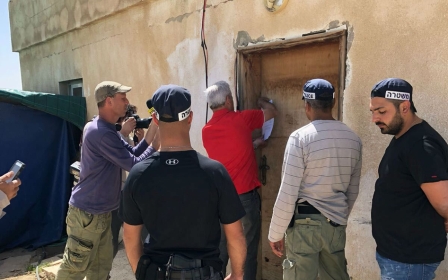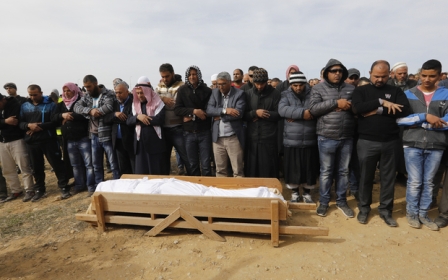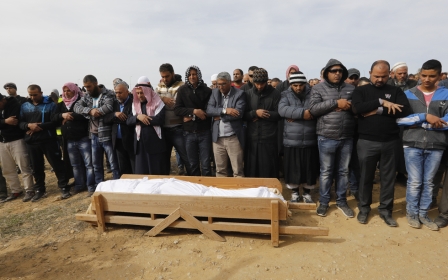Israeli inquiry clears officers of wrongdoing in Bedouin teacher killing

Israeli police officers who shot and killed a Palestinian citizen of Israel during a demolition raid in a Bedouin village were cleared of any criminal act, the Israeli justice ministry said on Tuesday.
Yaqoub Abu al-Qiyan, 50, was killed on 18 January 2017 while driving his vehicle as police staged a pre-dawn raid on the Bedouin village of Umm al-Hiran to demolish several homes built without Israeli government permission.
Police claimed at the time that Abu al-Qiyan was shot as he deliberately drove towards officers, hitting and killing a policeman.
However, eyewitnesses have said that Abu al-Qiyan did not constitute a threat when he was shot.
Videos of the event - including aerial footage shot by Israeli police - showed Abu al-Qiyan driving slowly in the area before shots were fired in his direction, after which his vehicle accelerated in the direction of the police officers.
An autopsy on Abu al-Qiyan showed that a first bullet hit his right leg, causing him to lose control of his car, while a second bullet hit him in the chest, causing severe internal bleeding.
Abu al-Qiyan was not given medical treatment, and bled to death at the scene after 20 minutes.
The Israeli State Attorney Office’s decision to close its investigation attests to the policy of whitewashing and its perception of the lives of Arab citizens of Israel as unequal to those of Jewish citizen
- Adalah
A police statement shortly after the event described Abu al-Qiyan as a "terrorist from the Islamic Movement", and suggested he may have had ties to the Islamist State group.
Tuesday's ministry statement said that there was no certainty that the impact that killed a policeman was deliberate, but also cleared police of criminal behaviour.
"There was no reasonable suspicion of criminal offences committed by the policemen involved in the incident," said the statement from the justice ministry, which is responsible for investigating suspicions of police misconduct.
"It was decided not to continue the inquiry into the incident."
It said that the police use of firearms was reasonable in light of their belief that their lives were in danger.
But it added there were "some issues" that the department referred back to the national police chief and the head of the police disciplinary department for them to consider if there was need for disciplinary action.
The statement said the Shin Bet internal security agency had examined the scene immediately after the deaths and had subsequently abandoned its investigation, saying it was unable to determine whether there had been a "terror attack".
Israeli police spokesman Micky Rosenfeld said on Tuesday that police “welcomed the decision made by the State Attorney’s Office”, adding that the ministry of justice investigation was “unfortunate” as it had “cut short” an internal police investigation into the case.
However, legal rights organisation Adalah said in a statement that it would file an appeal against the ministry’s decision.
“The Israeli State Attorney Office’s decision to close its investigation attests to the policy of whitewashing and its perception of the lives of Arab citizens of Israel as unequal to those of Jewish citizens,” the group said.
Abu al-Qiyan's nephew Raed also demanded a broader investigation.
"Who planned it, who took part, who gave the orders, who opened fire, who left him to bleed for 30 minutes and prevented medics from reaching him," he told Israeli public radio, citing what he said were the post-mortem findings.
He said that his late uncle had been a respected teacher and had represented Israel as a delegate to international conferences on education, science and technology.
Israeli authorities rarely indict members of the country’s armed forces who kill Palestinians. When charged for such deaths, sentences are often short - creating what Israeli human rights NGO Yesh Din has called a context of "near impunity".
Less than a week prior, Israel police officer Ben Deri was sentenced to nine months in prison as part of a plea deal for the 2014 killing of Palestinian teenager Nadim Nuwara - prompting rights groups to accuse the Israeli justice system of “whitewashing” state violence against Palestinians.
Palestinian citizens of Israel - including some 300,000 Bedouins - are descendants of Palestinians who remained after the creation of the state of Israel in 1948, and now make up around 20 percent of Israel’s population.
According to Adalah, more than 65 Israeli laws discriminate between Palestinian and Jewish citizens of Israel - "from citizenship rights to the right to political participation, land and housing rights, education rights, cultural and language rights, religious rights, and due process rights during detention".
Umm al-Hiran is one of 35 villages in the Negev that remain unrecognised by the state of Israel, which means the residents, all Israeli citizens, have never been granted building permits, basic services or infrastructure.
The villagers have been living under the threat of expulsion from the land since 2016, when the Israeli Supreme Court delivered its final demolition ruling against the village so that a Jewish-only town could be built on the site.
Middle East Eye propose une couverture et une analyse indépendantes et incomparables du Moyen-Orient, de l’Afrique du Nord et d’autres régions du monde. Pour en savoir plus sur la reprise de ce contenu et les frais qui s’appliquent, veuillez remplir ce formulaire [en anglais]. Pour en savoir plus sur MEE, cliquez ici [en anglais].




